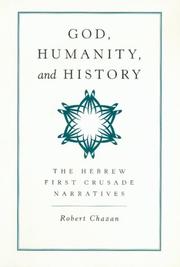| Listing 1 - 3 of 3 |
Sort by
|
Book
ISBN: 3110701383 Year: 2021 Publisher: Berlin ; Boston : De Gruyter,
Abstract | Keywords | Export | Availability | Bookmark
 Loading...
Loading...Choose an application
- Reference Manager
- EndNote
- RefWorks (Direct export to RefWorks)
Who were the early ancestors of East European Ashkenazic Jews, how were they related to the biblical Israelites/Judeans, and when and from where did they arrive in Eastern Europe? This book intends to answer these questions, but first it discusses some of the important questions that are neglected in the literature but important in the author’s work such as the ethnic composition of Canaan/Palestine and the switch from a patrilineal system (Israelites/Judeans) to a matrilineal one including converts (Jews). The author also discusses more present-day topics such as whether it is possible to determine if someone is (Ashkenazic) Jewish and a descendant of the biblical Israelites based on a genetic profile, and whether Ashkenazic Jews are more Jewish than Indian or Ethiopian Jews. Jits van Straten argues that the answer is negative in both cases, based on the official definition of who is a Jew. Finally, it is shown why East European Ashkenazis speak Yiddish without originating from a German-speaking region.
Jews. --- Ashkenazic Jewry. --- Demography. --- Human Genetics. --- Jewish History.
Book
ISBN: 128199491X 9786611994914 3484970634 3484731052 Year: 2008 Publisher: Tübingen : Max Niemeyer,
Abstract | Keywords | Export | Availability | Bookmark
 Loading...
Loading...Choose an application
- Reference Manager
- EndNote
- RefWorks (Direct export to RefWorks)
Gegenstand der Beiträge ist der Language and Culture Atlas of Ashkenazic Jewry , ein retrospektives Tonarchiv zum modernen europäischen Jiddisch mit ca. 5000 Stunden gesprochener Sprache. Angeregt wurde die Publikation durch die Aufbereitung der Originalsammlung als elektronisch aufbereitetes Archiv unter eydes.de im Internet. 18 Autoren bearbeiten wissenschaftsgeschichtliche, jiddistische, linguistische, ethnographische, historische und informatische Aspekte des Archivs und seines Umfelds. Unter anderem werden quantitative Methoden der 1960er Jahre aufgegriffen und korpuslinguistisch gewendet. Manche Autoren waren selbst an der Entstehung des Archivs in den 1960er Jahren beteiligt, sie analysieren und bewerten jetzt aus 50-jähriger Distanz. Der Band trägt zur Vergegenwärtigung des Jiddischen in Europa bei und damit zur Neuerkundung des mitteleuropäischen Raumes nach der Wende. Die Beiträge, fokussiert auf das Archiv, sind wissenschaftliche Reflexe auf die Vernichtung der europäischen Heimat des Jiddischen. Es wird sichtbar, wie dieser Verlust in Jiddistik, Linguistik und angrenzenden Kulturwissenschaften seinen Niederschlag gefunden hat und wie Wissenschaftler ihre gesellschaftliche Verantwortung in ihrer Fachdisziplin umsetzen.
Yiddish language. --- German Hebrew --- Hebreo-German language --- Jewish language --- Jiddisch language --- Judaeo-German language (Yiddish) --- Judeo-German language (Yiddish) --- Jews --- Languages --- Language and culture atlas of Ashkenazic Jewry. --- יידישער שפראך- און קולטור-אטלאס --- Yidisher shprakh- un ḳulṭur-aṭlas --- LCAAJ --- L.C.A.A.J. --- Language and culture archive of Ashkenazic Jewry --- Conversation Research. --- Cultural Archive. --- National Language. --- Yiddish.

ISBN: 0520923952 1597346373 9780520923959 0585422605 9780585422602 9780520221277 0520221273 0520221273 9781597346375 Year: 2000 Publisher: Berkeley, CA : University of California Press,
Abstract | Keywords | Export | Availability | Bookmark
 Loading...
Loading...Choose an application
- Reference Manager
- EndNote
- RefWorks (Direct export to RefWorks)
Although closely focused on the remarkable Hebrew First-Crusade narratives, Robert Chazan's new interpretation of these texts is anything but narrow, as his title, God, Humanity, and History, strongly suggests. The three surviving Hebrew accounts of the crusaders' devastating assaults on Rhineland Jewish communities during the spring of 1096 have been examined at length, but only now can we appreciate the extent to which they represent their turbulent times. After a close analysis of the texts themselves, Chazan addresses the objectives of the three narratives. He compares these accounts with earlier Jewish history writing and with contemporary crusade historiography. It is in their disjuncture with past forms of Jewish historical narration and their amazing parallels with Latin crusade narratives that the Hebrew narratives are most revealing. We see how they reflect the embeddedness of early Ashkenazic Jewry in the vibrant atmosphere of late-eleventh- and early-twelfth-century northern Europe.
Jews --- Jewish martyrs --- Crusades --- Church history --- Middle Ages --- Chivalry --- Martyrs, Jewish --- Hebrews --- Israelites --- Jewish people --- Jewry --- Judaic people --- Judaists --- Ethnology --- Religious adherents --- Semites --- Judaism --- History --- Persecutions --- Biography --- Germany --- Ethnic relations --- Juifs --- Martyrs juifs --- Croisades --- Sources --- Histoire --- Persécutions --- Allemagne --- Biographie --- Sources. --- Relations interethniques --- 1096. --- 11th century. --- 12th century. --- acculturation. --- anti jewish violence. --- antisemitism. --- ashkenazic jewry. --- assimilation. --- belonging. --- crusade. --- crusaders. --- discrimination. --- europe. --- exile. --- first crusade. --- genocide. --- gentiles. --- hebrew. --- history. --- jewish communities. --- jewish history. --- jewish lives. --- jewish people. --- jewish. --- judaica. --- judaism. --- martyrs. --- medieval. --- northern europe. --- prejudice. --- racism. --- religion. --- religious difference. --- religious persecution. --- rhineland jews.
| Listing 1 - 3 of 3 |
Sort by
|

 Search
Search Feedback
Feedback About
About Help
Help News
News